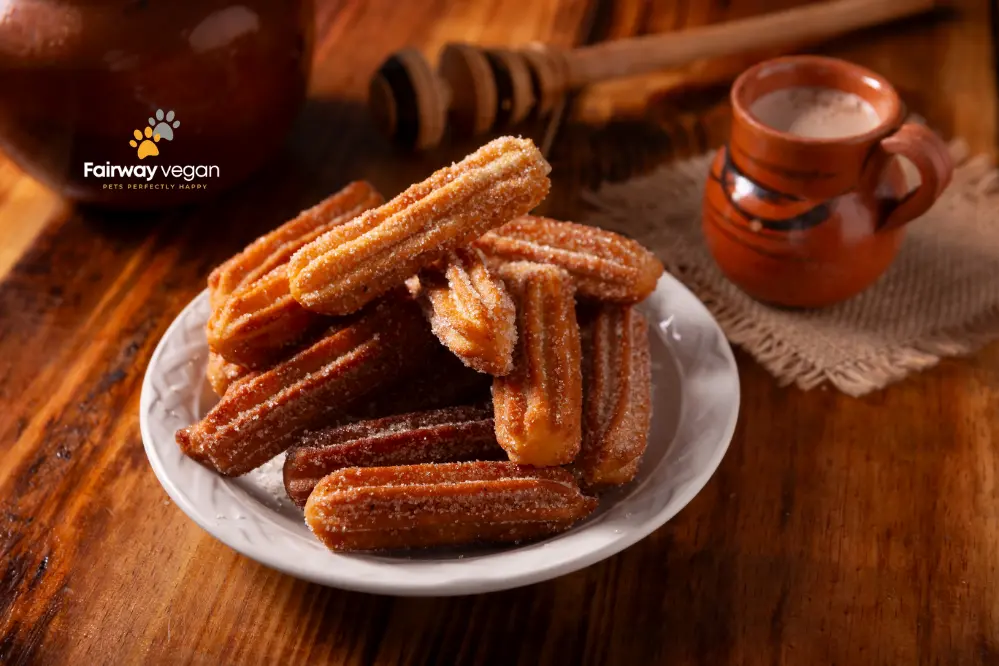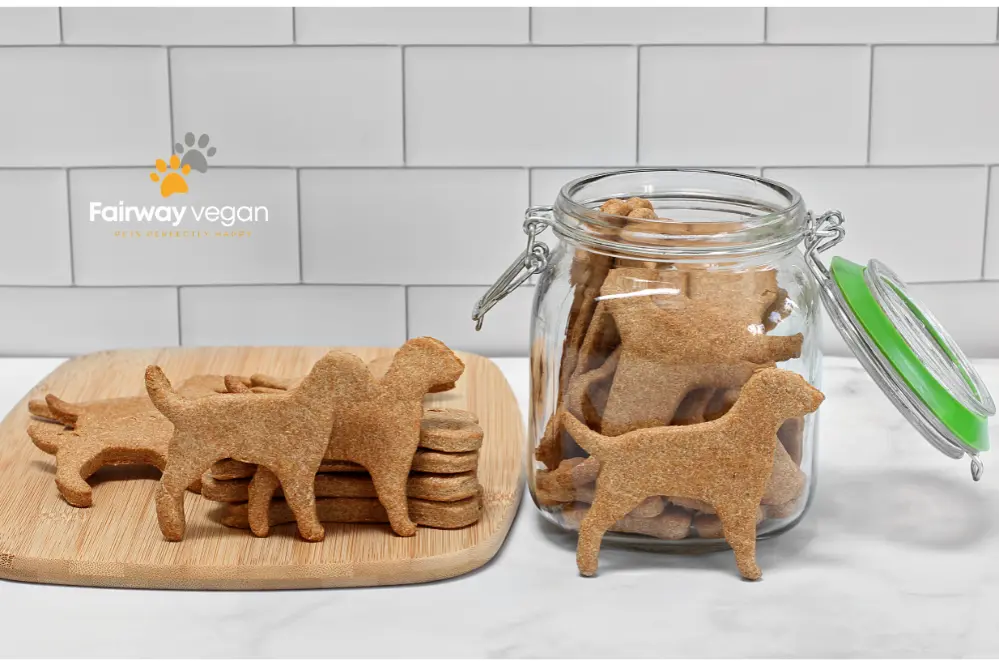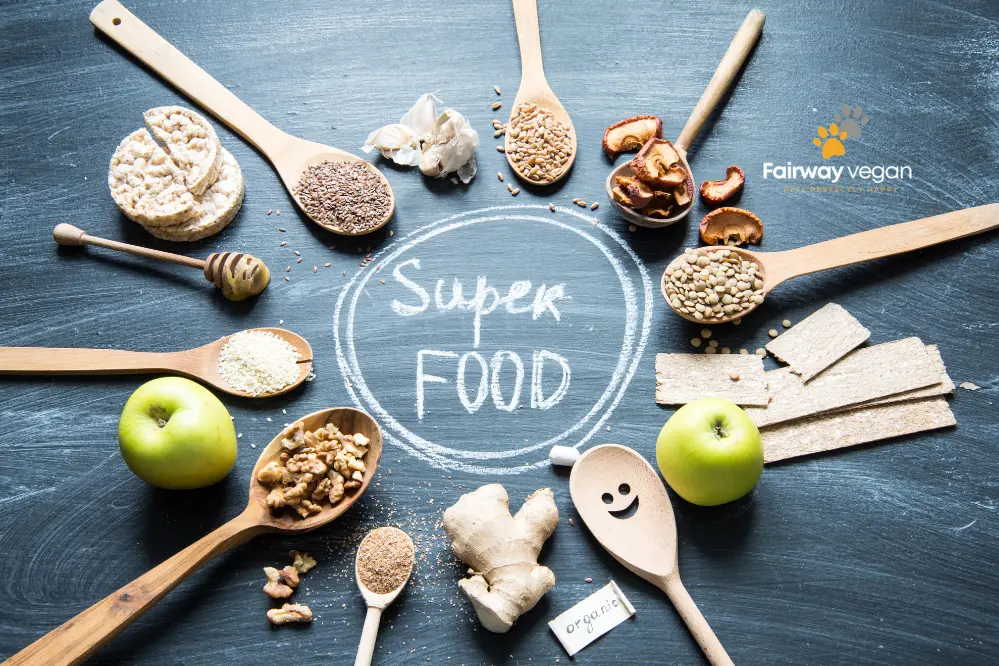Homemade Chicken Dog Food Recipes for a Healthy Diet

Feeding your dog a homemade diet is an excellent way to ensure they receive high-quality, nutritious ingredients tailored to their needs. Chicken is one of the most popular protein sources for dogs because it is lean, easy to digest, and packed with essential amino acids. By preparing meals at home, pet owners can avoid fillers, preservatives, and artificial additives commonly found in commercial dog food.
In this guide, we will explore the benefits of homemade dog food, discuss key ingredients necessary for a balanced meal, and provide three nutritious chicken-based recipes. These meals are designed to support your dog’s overall health, improve digestion, and provide essential nutrients for strong muscles, healthy skin, and a shiny coat.
At Fairway Vegan, we prioritize pet nutrition and wellness. For additional information on feeding your dog a nutrient-dense diet, read Top 10 Superfoods for Your Dog’s Diet to learn about ingredients that can enhance your dog’s health.
Why Choose Homemade Chicken Dog Food Recipes?

Homemade dog food allows pet owners to control the quality and source of ingredients, which is particularly beneficial for dogs with food allergies, sensitivities, or digestive issues. Some key advantages of preparing meals at home include:
- Control Over Ingredients: Avoid artificial preservatives, low-quality meat by-products, and fillers commonly found in store-bought pet food.
- Customization for Dietary Needs: Adjust ingredients to accommodate allergies, food intolerances, or specific nutritional needs.
- Improved Digestion: Natural, whole ingredients are easier for dogs to digest compared to processed foods.
- Enhanced Nutritional Value: Fresh, minimally processed ingredients retain more nutrients than commercial pet food.
For dogs with anxiety or stress-related digestive issues, maintaining a stable, nutritious diet can help. Learn more about behavioral challenges in How to Address Separation Anxiety in Dogs.
Key Ingredients for a Balanced Meal
When preparing homemade dog food, it is essential to include a variety of nutrient-rich ingredients to meet your dog’s dietary needs. A well-balanced meal should contain:
1. High-Quality Protein
Protein is the foundation of a healthy canine diet. Chicken is an excellent source of lean protein, providing essential amino acids for muscle development and overall well-being. Boneless, skinless chicken breasts or thighs are the best choices.
2. Complex Carbohydrates
Carbohydrates provide energy and fiber, aiding digestion and maintaining steady blood sugar levels. Recommended options include:
- Brown rice
- Quinoa
- Sweet potatoes
- Oatmeal
3. Nutrient-Dense Vegetables
Vegetables provide vitamins, minerals, and fiber essential for digestive health and immune function. Safe options for dogs include:
- Carrots
- Peas
- Green beans
- Pumpkin (supports digestion)
- Spinach (in moderation)
4. Healthy Fats
Fats are crucial for brain function, skin health, and a shiny coat. Incorporate healthy fats such as:
- Coconut oil
- Flaxseed oil
- Fish oil
- Olive oil
5. Essential Supplements (If Needed)
Some homemade diets may require additional supplements, such as calcium (if avoiding bones) or omega-3 fatty acids for joint support. Consult with a veterinarian to ensure your dog’s diet is nutritionally complete.
Foods to Avoid For a Healthier Dog
Certain ingredients are toxic to dogs and should never be included in homemade meals:
- Garlic and onions
- Grapes and raisins
- Chocolate and caffeine
- Artificial sweeteners (especially xylitol)
- Raw chicken bones (can splinter and cause internal injuries)
3 Healthy Chicken Dog Food Recipes

1. Chicken and Rice Dog Food Recipe (Gentle on Digestion)
This simple recipe is ideal for dogs with sensitive stomachs or recovering from an upset stomach. The combination of lean protein, easily digestible carbohydrates, and mild vegetables provides balanced nutrition without causing digestive distress.
Ingredients:
- 1 pound boneless, skinless chicken breast
- 1 cup cooked brown rice
- ½ cup diced carrots
- ½ cup peas
- 1 tablespoon coconut oil
Instructions:
- Boil the chicken in water until fully cooked, approximately 15 to 20 minutes. Shred into small, bite-sized pieces.
- Cook the brown rice according to package instructions.
- Lightly steam the carrots and peas until tender.
- Combine all ingredients in a large bowl, adding coconut oil for additional nutrients.
- Let the food cool completely before serving.
2. Chicken, Sweet Potato, and Spinach Dog Food Recipe
This nutrient-packed meal contains essential vitamins and minerals to support a strong immune system, healthy skin, and joint health.
Ingredients:
- 1 pound boneless, skinless chicken thighs
- 1 large sweet potato, peeled and diced
- ½ cup chopped spinach
- ½ cup cooked quinoa
- 1 tablespoon flaxseed oil
Instructions:
- Bake or boil the sweet potato until soft.
- Cook the chicken in a pan over medium heat until thoroughly cooked. Cut into small pieces.
- Lightly steam the spinach to retain its nutrients.
- Mix all ingredients together in a bowl and stir in flaxseed oil.
- Allow the food to cool before serving.
3. Chicken and Pumpkin Stew
Pumpkin is a great source of fiber and can help dogs with digestive issues. This hearty stew is both nutritious and easy to prepare.
Ingredients:
- 1 pound ground chicken
- 1 cup canned pumpkin (unsweetened)
- ½ cup chopped green beans
- ½ cup cooked oatmeal
- 1 tablespoon olive oil
Instructions:
- Cook the ground chicken in a skillet over medium heat until fully browned.
- Steam the green beans until soft.
- In a large pot, mix all ingredients together, including the pumpkin and oatmeal.
- Add olive oil and stir to combine.
- Allow the stew to cool before serving.
Serving and Storage Tips
- Portioning: Serve approximately ½ cup per 20-25 pounds of body weight per meal. Adjust portions based on your dog’s activity level and metabolism.
- Storage: Refrigerate leftovers for up to four days or freeze in portioned containers for up to two months.
- Transitioning: When introducing homemade food, do so gradually over the course of a week to avoid digestive upset.
Final Thoughts
Making homemade dog food is a great way to provide your pet with high-quality, natural ingredients that promote long-term health. These 3 chicken dog food recipes offer a variety of flavors and essential nutrients while ensuring a balanced diet for your dog.
For more insights on pet nutrition and health, visit Fairway Vegan. If you are interested in understanding pet behaviors and common challenges, read Understanding Common Cat Behavioral Issues—a useful resource for pet owners looking to enhance their pets’ well-being.
By preparing fresh meals with wholesome ingredients, you can help your dog thrive and maintain optimal health for years to come.
Recent Comments

Homemade Chicken Dog Food Recipes for a Healthy Diet

7 Vet-Approved Homemade Dog Food Recipes for a Healthier Pup

Can You Freeze Fresh Pet Dog Food?

Top 10 Superfoods for Your Dog's Diet

Top 10 Most Popular Dog Breeds in the UK

Homemade Chicken Dog Food Recipes for a Healthy Diet

Dog Grooming Made Easy: Must-Have Tools, Costs, and Pro Tips!
